Euro 2024 was a tournament that will live long in the memory for the complexity of the third-placed group-stage qualifiers, long-range screamers and, curiously, star strikers who misfired.
Indeed, the bookies' top 10 pre-tournament favourites for the Golden Boot top scorer award -- a list that included the likes of Harry Kane (3), Kylian Mbappé (1), Álvaro Morata (1), Cristiano Ronaldo (0), Romelu Lukaku (0) and Antoine Griezmann (0) -- scored a combined 12 goals, while the tournament as a whole saw 117 goals in 51 matches, compared to 142 at Euro 2020. In the end, six players shared the Golden Boot award and half of them -- Dani Olmo (Spain), Cody Gakpo (Netherlands) and Jamal Musiala (Germany) -- weren't strikers.
But how and why did this happen? Well, Euro 2024 saw a huge variety of different striker roles used by managers and, when looking into what those roles entailed, you can see why many didn't consistently find the back of the net. Here we've analysed a selection and tried to explain why that led to the star men not scoring anywhere near as much as you'd think.
The Pure Poacher: Cristiano Ronaldo (Portugal)
We begin with one of the major factors in this discussion: Ronaldo. The 39-year-old had a European Championship to forget for Portugal and his statistics tell the story: 23 shots, zero goals and one missed penalty.
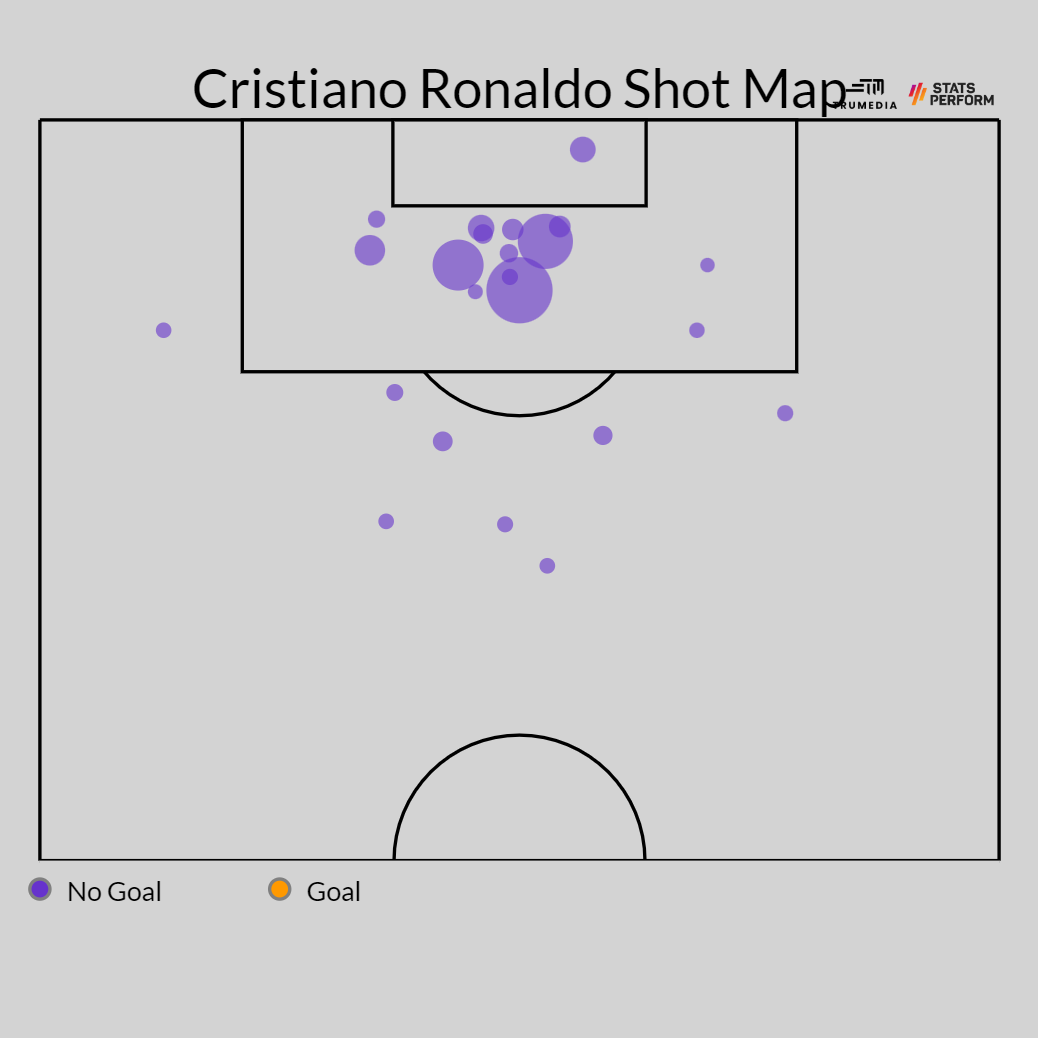
The bigger the circle, the better the xG. Ronaldo scored no goals at the tournament.
Ronaldo is not alone when it comes to underperforming in front of goal during this tournament, but his poor form was particularly problematic for Portugal as they wired their entire attacking system towards servicing him with chances. That manifested in extremely talented attacking midfielders like Bruno Fernandes and Bernardo Silva crossing rather than shooting when the latter was the better option, and all aiming for one man.
With Ronaldo's focus on shooting, he did little else -- presumably to save his legs for explosive leaps and vicious strikes. In fact, he was completely freed from any defensive responsibility by manager Roberto Martínez, hardly did any running, and played little part in build-up play.
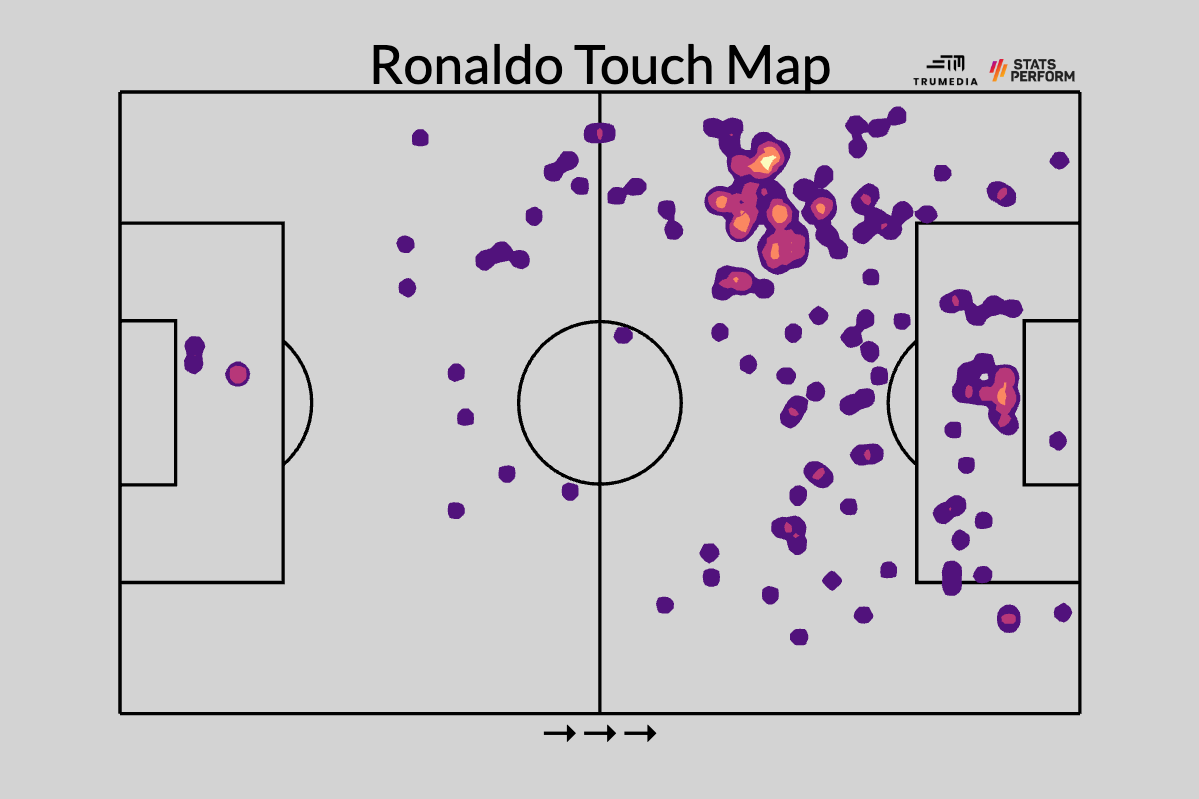
Ronaldo played 486 minutes at Euro 2024, but only recorded 157 touches
As his touch map indicates, Portugal moved the ball from goalkeeper to the final third pretty easily without Ronaldo needing to get on the ball. Indeed, Martínez's plan was to build a team who were physical and hardworking off the ball -- making them hard to beat -- and focused on creating chances for Ronaldo when on it. In that sense the plan succeeded, but it fell down because of his star man's poor finishing.
The Do-It-All Forward: Kai Havertz (Germany), Memphis Depay (Netherlands), Georges Mikautadze (Georgia)
True to the trend of modern football, Euro 2024 gave us very few poachers but plenty of forwards whose role consisted of much more. For these players, finishing was only 50% of the job; their link play, movement towards the ball and runs off the ball were crucial to the way their team operated in attack.
Havertz is our first example and it's probably for the best that his job scope was wider than just scoring, as his xG (Expected Goals) underperformance (-2.1) was second only to Ronaldo (-3.6) in this tournament.
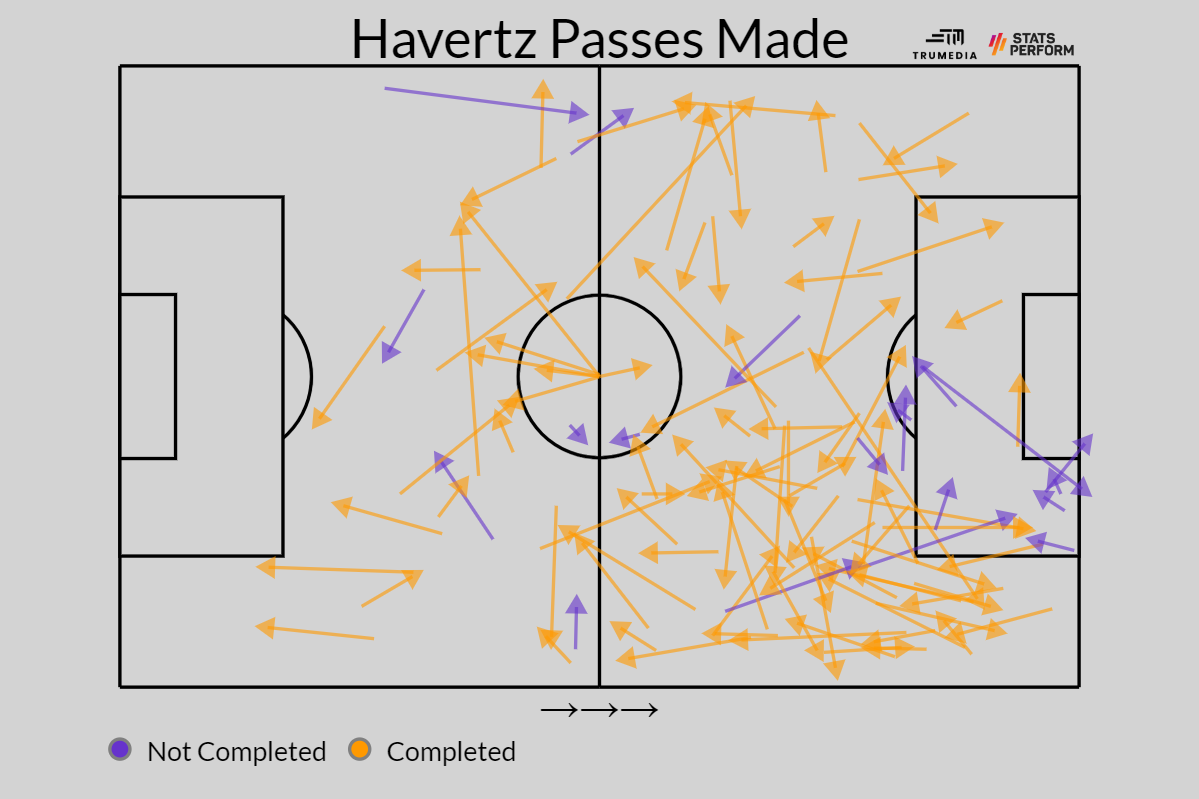
His movement ahead of the ball was good, making selfless runs to commit defenders and create space between the lines for teammates Ilkay Gündogan and Jamal Musiala. He was happy to head out wide to receive the ball too, allowing his midfielders to run beyond him, and he clearly preferred to drift towards the right.
Havertz was heavily involved in most phases and racked up significantly more touches per 90 (43 to 29) and passes attempted per 90 minutes (26.5 to 17.8) than Ronaldo, while falling just shy of him in shots (19 to 23).
Depay played a similar role for Netherlands as he was involved in just about everything. His touches per 90 figure (46.9) was even higher and he found room for 17 shots on goal -- though only three hit the target and one went in.
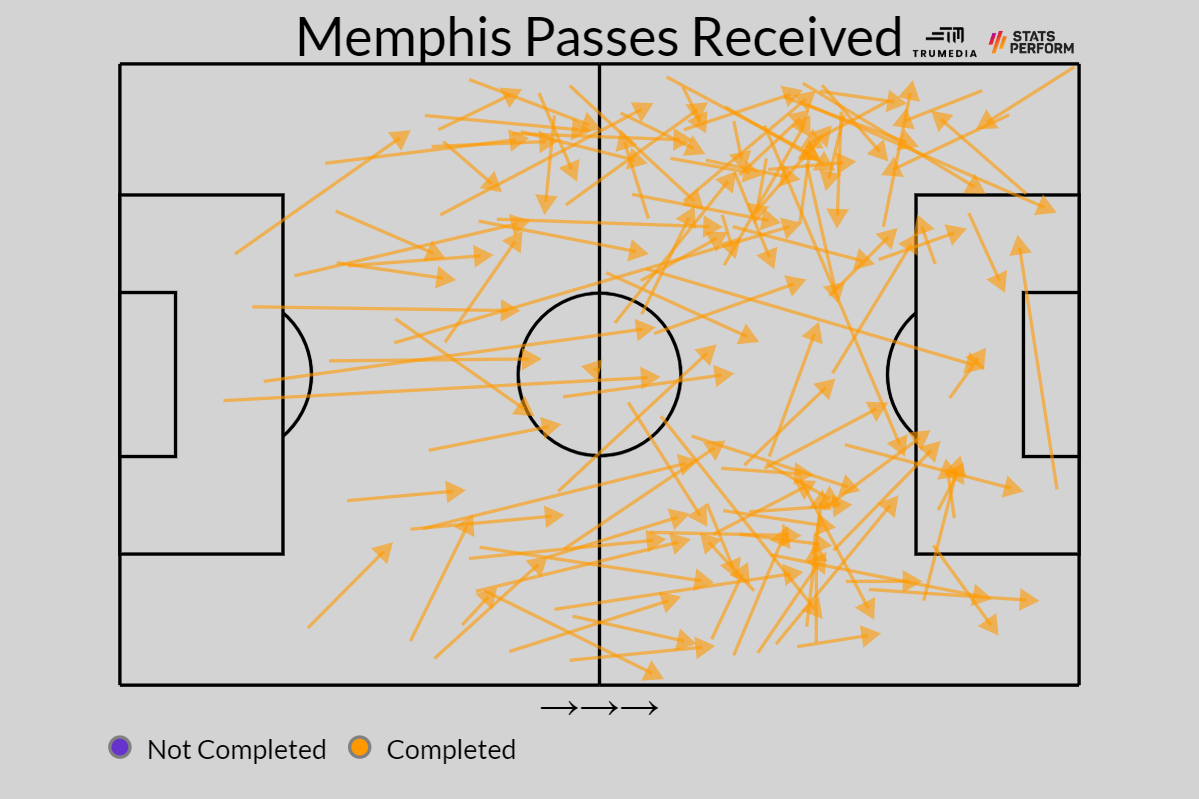
Depay actually spent a lot of time vacating the centre of the pitch to receive the ball, happy to move left or right but preferring the former, as that allowed him to link play with the impressive Cody Gakpo. Gakpo's direct running, intensity and willingness to shoot from distance emerged as Netherlands' biggest threat on goal, with right-back Denzel Dumfries' marauding runs up the flank to the far post a close second. That left Depay with something of an interpretive role, geared towards finding space as and when he could, and doing what he could to get Gakpo galloping toward the box.
Then there's Mikautadze, who scored three goals (albeit two were from the penalty spot) for Georgia despite the fact his role was far from that of a traditional striker. In fact, if you only looked at his touch map and didn't watch any footage, you'd have a tough time figuring out what position he played.
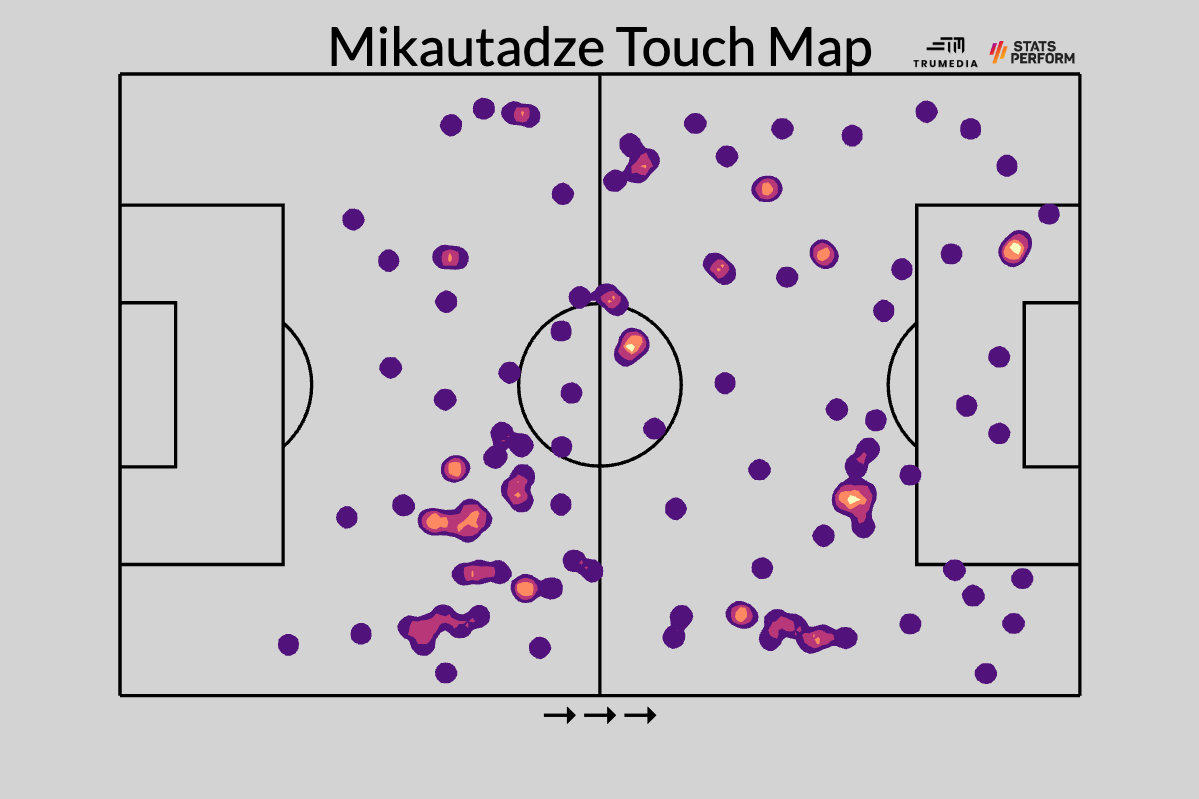
His job was to occupy defenders, work backwards to help defend and, most importantly, try to release Napoli's Khvicha Kvaratskhelia to go on a mazy dribbling run whenever he could. This worked a treat in the final group game against Portugal, as his perfectly weighted ball found "Kvaradona" in stride and Mikautadze bore down on goal to finish wonderfully. But the fact Mikautadze only managed six shots in 347 minutes -- two of which came from the spot, remember -- reveals how broad a role he had for an exciting Georgia team that defied expectations by reaching the round of 16.
The Free Spirit: Kylian Mbappé (France), Arda Güler (Turkey)
In many ways, this is a player's dream role and one we'd all love to try. It allows you to drift wherever you want on the pitch, impacting the game however you wish, and not have to worry about defensive responsibility at all.
It was obvious in France's first game how much manager Didier Deschamps was willing to sacrifice certain players and have them work extra hard defensively to cover for Mbappé. The concept is similar to the one outlined with Ronaldo above: Ideally, you want to save Mbappé's energy for explosive, decisive attacking moments, rather than expend it on him tracking back to help out his defence.
A tag-team combination of Marcus Thuram, Adrien Rabiot and N'Golo Kanté all covered for Mbappé's defensive work, leaving him free to either come to the ball or run in behind to stretch the opponents. Mbappé was greatly involved in the game either as a centre-forward or a winger, averaging 51.8 touches per 90, 33.7 passes attempted per 90, yet still finding time for a tournament-high 24 shots -- one more than Ronaldo.
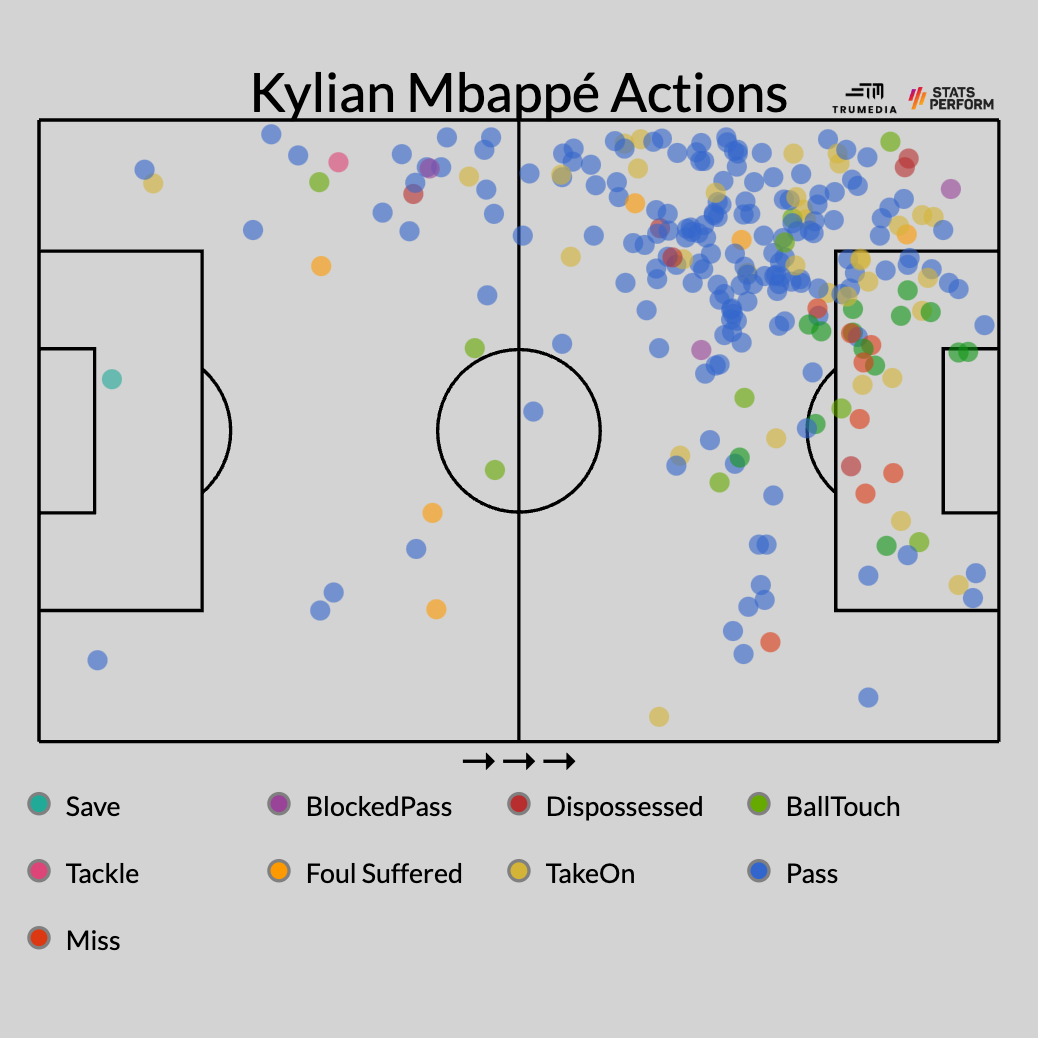
Unfortunately for Les Bleus, the only strike he converted was a penalty against Poland, and he missed some wonderful openings -- most notably blasting over in the closing stages of the semifinal against Spain. Of course he broke his nose in the first game, missed the second and then had to wear a protective mask, which certainly impacted his form.
The only other forward to enjoy Mbappé's combination of attacking freedom and importance was Turkey's Güler, who delighted spectators with his twists, turns, passes and strikes on goal.
Quite often Turkey fell back into a 5-4-1 defensive shape and left the 19-year-old up top on his own, absolved of defensive work -- he didn't really press or work backwards, which was clearly by tactical design. When they won the ball back he would make a move -- often to the right side -- to receive the ball, turn and play. And, as dynamics go, it worked well.
Fellow forwards Kenan Yıldız and, especially, Barış Yılmaz worked ridiculously hard to help cover the gaps Güler left, knowing that he was their best route to a clear-cut chance or goal. Güler certainly paid that faith back, bagging a goal and two assists in his 342 minutes to help Turkey into the quarterfinals.
The Extra Defender: Harry Kane (England), Álvaro Morata (Spain)
"My role isn't just scoring goals. My role is a lot of work defensively, a lot of work without the ball," England captain Kane told The Daily Telegraph in the buildup to the semifinals. And it was a little surprising to hear it stated so clearly for a player who has scored 66 goals in 98 games for his country -- even if all the on-pitch evidence supported the claim.
After scoring against Denmark, he dropped so deep that the map of his average position had him at left-back. Indeed, Kane spent more time blocking passing lanes in midfield and helping his defence out at set pieces than he did making attacking runs or busting a gut to get into shooting positions.
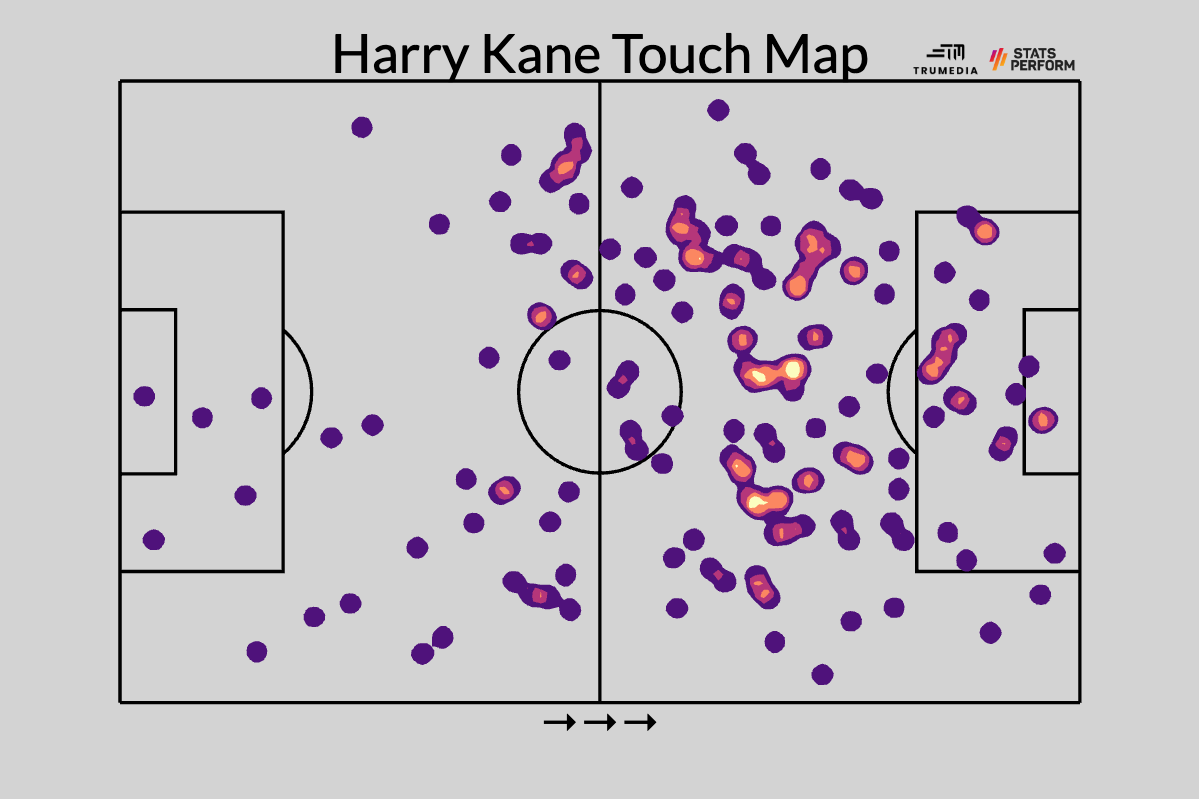
He did find his way to three goals, though two of those came from set-piece situations. Give Kane seven games at a tournament and you'd usually expect five or more goals, but that was never realistic given the way he used his energy and the areas of the pitch he tended to operate in.
Spain's Morata was also surprisingly "negative" in his play for a bona fide No. 9 striker who has made a career out of running in behind defences. He scored his only goal of the tournament doing this in the first game, then all but stopped doing so once Spain's wing wonders, Lamine Yamal and Nico Williams, took command of the attack.

In fact, there were times across both the quarterfinal and semifinal where Morata felt like as much of a spectator as those who paid for seats in the stadium. Spain worked the ball smoothly through the midfield, wide and towards goal without really utilising him at all.
To stay involved he dropped deeper and deeper, culminating in a performance against France in the semis where he was fouled four times in his own half, as he was protecting the ball and trying to help launch counter-attacks.
"I don't know if people noticed or not but I was working nonstop this whole tournament," he told Teledeporte after the final. "I knew I had to fight and to free up spaces for my teammates. For me, that is worth more than having scored 20 goals."
Perhaps it's symbolic that these two led their teams as captains and sacrificed an enormous amount of individual attacking opportunity over the course of the tournament in order to make their nations hard to beat, which is part of the necessary grind in a knockout format. The fact they faced off in the final suggests they were doing something right.
